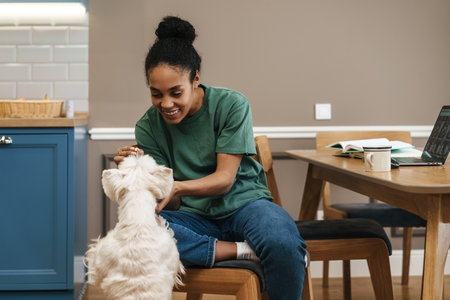Introduction to Pet Grooming in the UK
In the United Kingdom, pet grooming is not just a matter of keeping our beloved animals clean—it is a cherished tradition woven into daily British life. From the charming streets of rural villages to the bustling heart of London, you’ll find dog owners brushing coats, trimming nails, and visiting local groomers with regularity. Traditional practices such as hand-stripping for terriers or scissoring for poodles are paired seamlessly with modern techniques, including mobile grooming vans and eco-friendly shampoos. These routines are deeply valued in British pet culture, reflecting both a sense of responsibility and affection towards our furry companions. Routine grooming goes beyond aesthetics; it’s an essential ritual that supports overall well-being and strengthens the unique bond between pets and their humans across the UK.
2. Mental Health Benefits for Pets
Routine pet grooming goes far beyond maintaining a shiny coat or trimming nails; it plays a significant role in supporting the mental health of pets across the UK. Just as regular self-care benefits people, consistent grooming routines can have a profound impact on your furry companion’s emotional wellbeing.
One of the most notable benefits is stress reduction. Many pets, especially dogs and cats, thrive on routine. Knowing what to expect from their day-to-day experiences helps them feel secure and calm. Grooming sessions—when carried out gently and patiently—can become a familiar ritual that reassures your pet and alleviates anxiety.
Grooming also fosters a stronger bond between pet and owner. The close contact involved in brushing, bathing, or even ear cleaning offers an opportunity for positive physical touch and communication. This intimate interaction not only builds trust but also helps you notice subtle changes in your pet’s mood or health, allowing for early intervention if something seems amiss.
How Routine Grooming Supports Pet Mental Wellbeing
| Grooming Benefit | Mental Health Impact | Real-life Example (UK context) |
|---|---|---|
| Reduced Stress Levels | Calms anxious pets by creating predictable routines | A rescue dog settling into a new home finds comfort in daily brushing |
| Strengthened Human-Animal Bond | Enhances trust and feelings of security | A cat becomes more affectionate after regular gentle grooming sessions |
| Increased Socialisation Skills | Prepares pets for interactions with other people or animals | A regularly groomed dog remains relaxed during vet visits or trips to the local park |
| Early Detection of Health Issues | Reduces anxiety linked to undiagnosed discomfort or pain | An owner spots a skin irritation early, preventing prolonged distress for their rabbit |
By making grooming a regular part of your pet care routine, you are not just keeping your companion looking their best—you are actively supporting their emotional health. For many UK households, these small acts of care contribute greatly to happier, more contented pets who feel truly at home.

3. Grooming as Preventative Healthcare
Regular grooming is much more than a chance to keep your pet looking smart; it acts as a vital form of preventative healthcare for pets across the UK. By making grooming part of your routine, you have the opportunity to notice small changes in your pet’s skin and coat that might otherwise go unnoticed. Common issues such as dry patches, redness, or lumps can often be detected early while brushing or bathing, allowing you to seek veterinary advice before problems escalate.
Parasites like fleas and ticks are unfortunately prevalent in Britain’s temperate climate, particularly during spring and summer. Through regular grooming sessions, you can spot these pests quickly, helping to prevent infestations that could impact both your pet’s comfort and their health. Early detection of flea dirt, tick bites, or mite irritation means you can act swiftly with appropriate treatments, sparing your pet from unnecessary discomfort.
Beyond parasites, skin infections or allergic reactions caused by environmental factors—such as pollen from local parks or city pollutants—can also be identified when you pay close attention during grooming. By checking ears, paws, and underbellies, you may catch signs of dermatitis or hot spots before they become serious. In this way, routine care supports not only the physical wellbeing of UK pets but also contributes positively to their overall mental health by reducing stress associated with undetected illness or discomfort.
4. The Role of Professional Groomers
In the UK, the pet grooming industry has seen remarkable growth, reflecting the nation’s deep care for animal welfare and wellbeing. Professional groomers now play a pivotal role in not only maintaining pets’ appearances but also supporting their mental health. Many British pet owners turn to qualified groomers, trusting them with both routine trims and specialised treatments designed to keep pets calm and comfortable.
The Rise of Grooming Services in the UK
With more people welcoming pets into their homes, demand for professional grooming services has soared. From bustling high streets in London to charming rural villages across England, Scotland, Wales, and Northern Ireland, groomers have become a familiar sight. These professionals offer everything from breed-specific cuts to de-shedding treatments, ensuring every pet receives bespoke care suited to their needs and temperaments.
Qualifications and Standards
UK groomers are expected to uphold high standards of practice. Many pursue formal qualifications such as City & Guilds Level 2 or 3 Diplomas in Dog Grooming, and may be members of respected organisations like the British Dog Groomers’ Association (BDGA). This commitment to training ensures that groomers understand animal behaviour, safe handling techniques, and the importance of stress reduction during each session.
| Qualification | Description | Benefit for Pets |
|---|---|---|
| City & Guilds Level 2/3 | Practical skills & animal welfare knowledge | Safe, gentle handling reduces anxiety |
| BDGA Membership | Professional network & ethical standards | Consistent quality care |
Mental Health Support Through Professional Care
A skilled groomer recognises signs of nervousness or fear and adapts their approach accordingly—perhaps using soothing voices, gentle touch, or offering breaks if a pet becomes unsettled. Regular visits help pets become familiar with the process, reducing fear over time and building trust between animal and carer. For dogs and cats prone to stress or anxiety, this consistent routine can make a world of difference.
How Groomers Support Mental Wellbeing:
- Create a calm salon environment with minimal noise and distractions
- Use positive reinforcement techniques throughout appointments
- Monitor for early signs of skin conditions or discomfort affecting mood
- Communicate openly with owners about behavioural changes noticed during grooming sessions
By choosing a reputable UK grooming professional, pet owners ensure their companions receive expert attention that goes far beyond aesthetics—nurturing confidence and supporting lifelong mental health.
5. Grooming at Home: Tips for UK Pet Owners
Grooming your pet at home can be a rewarding and calming experience for both you and your furry companion. Establishing a gentle, consistent routine not only keeps your pet looking their best but also supports their mental wellbeing. Here are some practical tips for British pet owners looking to create a stress-free grooming environment using locally available products suitable for UK pets.
Create a Calm Atmosphere
Choose a quiet space in your home where your pet feels safe—perhaps a cosy corner or a favourite room. Softly spoken words and gentle strokes can help reassure your pet before you begin. Consider playing soothing background music or giving your pet time to settle before starting the grooming process.
Select the Right Tools and Products
Opt for brushes, combs, and shampoos designed specifically for your breed of cat or dog, many of which are readily available at local UK pet shops such as Pets at Home or Jollyes. For example, slicker brushes work well for long-haired breeds, while soft bristle brushes suit short-haired pets. Choose hypoallergenic shampoos made in the UK to minimise skin irritation, especially if your pet has sensitivities common in the British climate.
Brush Gently and Regularly
Regular brushing prevents mats and tangles and allows you to check for any unusual lumps or skin problems early on. For dogs, a weekly brush may suffice, while some cats benefit from more frequent sessions. Remember to brush in the direction of hair growth and always praise your pet during and after grooming to build positive associations.
Make Bath Time Stress-Free
Bathe your pet only when necessary—over-bathing can strip natural oils from their coat. Use lukewarm water and ensure all products are thoroughly rinsed out. Placing a non-slip mat in the bath can help nervous pets feel more secure. After bathing, dry your pet gently with a towel or use a low-heat hairdryer designed for animals.
Paws, Ears, and Teeth Matter Too
Don’t forget about nails, ears, and teeth! Trim nails carefully using UK-approved clippers and consult your vet if you’re unsure how to do this safely. Clean ears with vet-recommended solutions and inspect regularly for signs of infection. Dental chews and toothbrushes for pets are widely available across Britain—regular dental care helps prevent future health issues.
Build Trust Over Time
If your pet is anxious about grooming, start slowly with short sessions and gradually increase the time as they become more comfortable. Reward calm behaviour with healthy treats sourced from reputable UK brands to reinforce positive experiences.
By making grooming an enjoyable part of your routine, you not only keep your pet looking smart but also contribute positively to their emotional health—an essential aspect of responsible British pet ownership.
6. Addressing Common Challenges
It’s not uncommon for pets in the UK to feel anxious or even downright resistant when it comes to grooming sessions. This can be especially true for rescue animals, nervous breeds, or those who have had negative experiences in the past. Fortunately, with thoughtful strategies and advice from UK-based animal behaviourists, we can help our furry friends feel more comfortable while maintaining their coat and wellbeing.
Understanding Pet Anxiety During Grooming
Pets pick up on our emotions and the environment around them. If they sense tension or fear, they may become even more uneasy. British pet behaviourists recommend starting grooming routines slowly and making them a positive experience by offering gentle words, soothing strokes, and plenty of treats. For example, using a calm voice and maintaining a relaxed atmosphere—perhaps with soft radio playing in the background—can go a long way towards easing a pet’s nerves.
Gradual Desensitisation Techniques
If your pet is particularly sensitive to grooming tools or being handled, gradual desensitisation is key. Introduce brushes, combs, or nail clippers one at a time, allowing your pet to sniff and investigate before any actual grooming begins. Start with short sessions and always reward good behaviour with praise or a favourite treat. Over time, this helps build trust and reduces stress associated with grooming.
Seeking Professional Help When Needed
Sometimes, despite your best efforts, professional intervention might be necessary. Many UK groomers are trained to handle nervous or reactive pets with patience and understanding. Behaviourists can also work with you to develop bespoke strategies tailored to your pet’s needs—be that through counter-conditioning techniques or structured training plans.
Remember, every pet is unique. By taking the time to address common challenges with empathy and patience, we support both their mental health and overall happiness—making routine care a rewarding experience for everyone involved.
7. Conclusion: Promoting Holistic Pet Care
As we’ve explored, the link between pet grooming and mental health is far more significant than many UK pet owners may initially realise. Routine grooming not only keeps our furry companions looking their best but also plays a vital role in supporting their emotional wellbeing. Through gentle brushing, regular bathing, and consistent health checks, pets experience reduced anxiety, increased comfort, and stronger bonds with their humans. For British households, integrating these practices into daily life means embracing a holistic approach to pet care—one that values both physical health and happiness. By prioritising routine grooming as part of overall wellbeing, pet owners can ensure their beloved animals lead enriched, balanced lives filled with trust and contentment. Let’s champion this all-encompassing care for our pets across the UK, making regular grooming an essential element of responsible and loving ownership.


